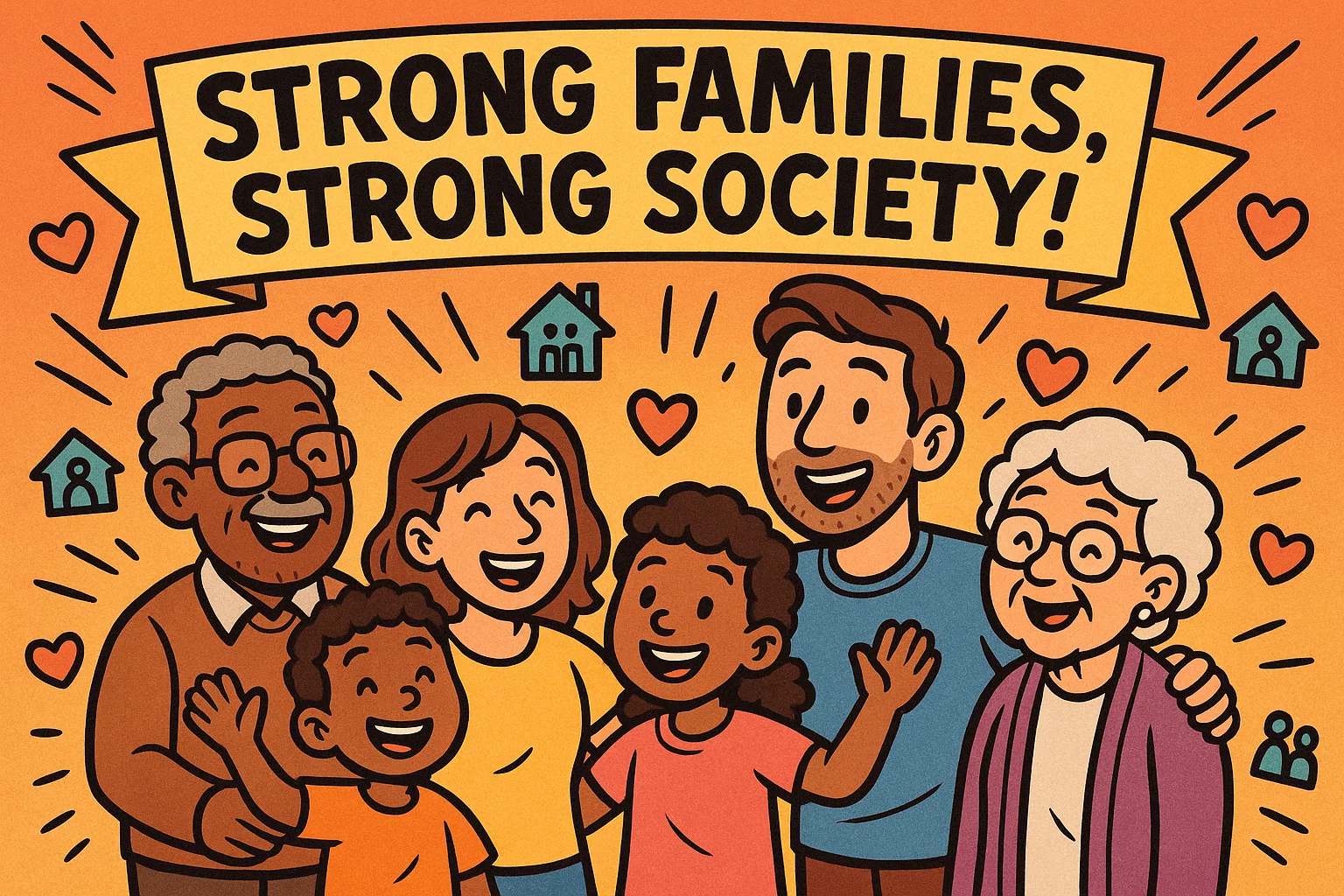The concept of family has always been the foundation upon which society is built, serving as the first environment where values, traditions, and identity are shaped. Its role goes far beyond survival: it provides security and stability, teaches essential skills, and supports the development of children. Every culture recognizes that the household is the first unit of social life, and through close communication and relationships, individuals learn how to function as part of society.
In modern times, shifts in family structure, technology, and work patterns challenge traditional bonds, yet the importance of family remains central. A supportive home with strong values plays a key role in shaping dynamics and ensuring healthy functioning. By fostering unity, building strong relationships, and strengthening support within the household, families not only nurture individuals but also contribute to society, proving their importance across all aspects of life.
Definition and Role of Family in Modern Society
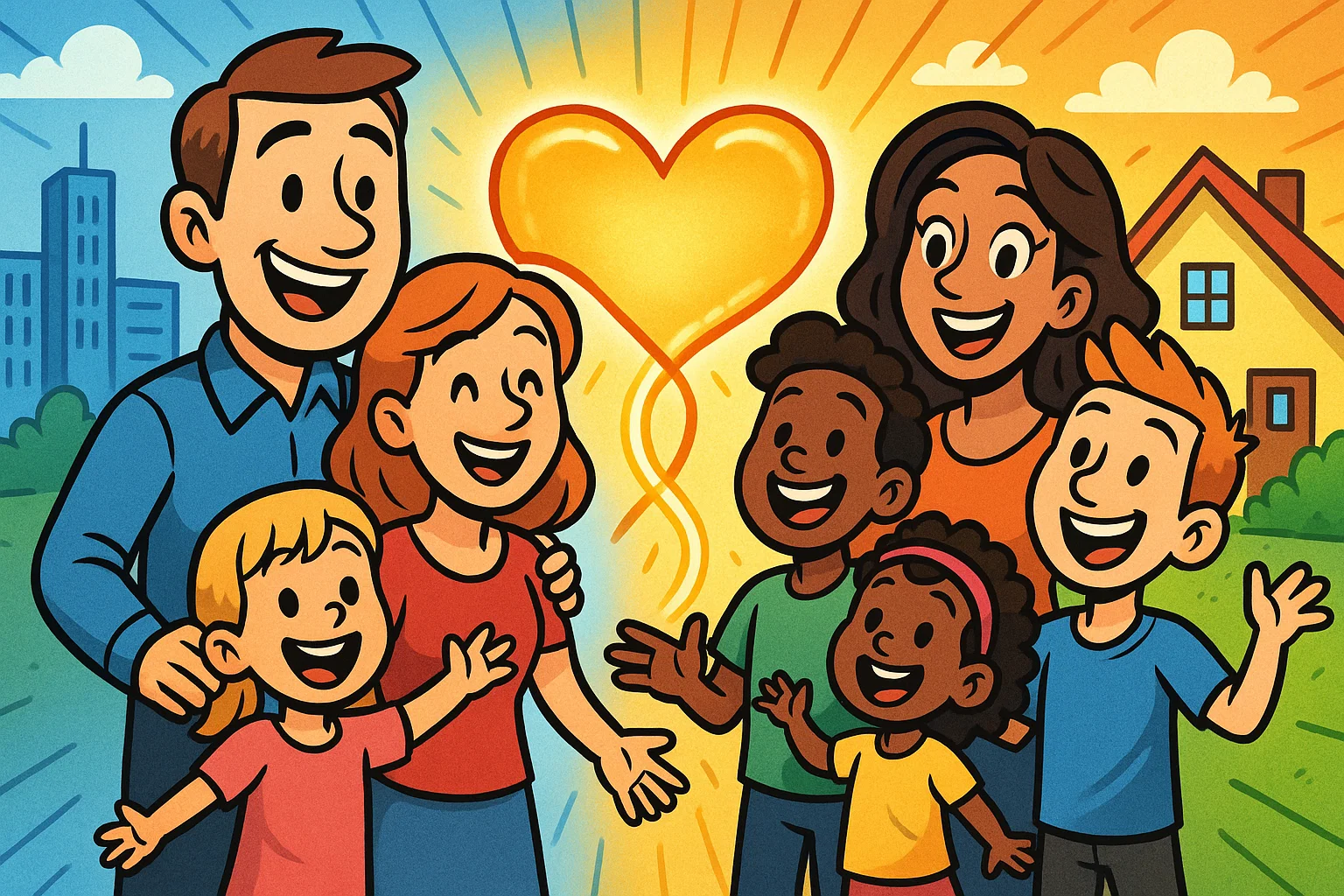
Historical perspective on family
The concept of kinship has evolved significantly throughout human history, adapting to social, economic, and cultural changes while maintaining its fundamental purpose. Traditional structures were primarily organized around survival needs, with extended networks providing security, shared resources, and knowledge transfer from generation to generation.
In agricultural societies, households served as economic units where every member contributed to productivity. The structure was hierarchical, with clear roles and responsibilities that ensured group survival. This model created strong interdependencies that reinforced unity and mutual support systems.
The industrial revolution marked a significant shift in dynamics, as urbanization and factory work began separating members for extended periods. Despite these changes, the household remained the primary institution for child-rearing, emotional support, and social identity formation.
Family as foundation of society
The fundamental unit of society plays a crucial role as the building block of communities, serving as the first and most influential social institution that individuals encounter. Within these units, people learn basic social skills, moral values, and behavioral patterns that will guide their interactions throughout life.
Research consistently shows that strong families contribute to communities by producing well-adjusted individuals who are more likely to become productive members of society. These units provide stable environments where children develop the emotional intelligence and social competencies necessary for healthy relationships with others.
Furthermore, households serve as economic units that contribute to overall stability and prosperity. When functioning is healthy, it reduces the burden on social services, healthcare systems, and correctional institutions, allowing communities to allocate resources more effectively toward growth and development.
Family as social unit in changing times
Modern families face unprecedented challenges as they adapt to rapid technological advancement, changing gender roles, and evolving social expectations. The traditional nuclear model now coexists with various structures, including:
- Single-parent households
- Blended arrangements
- Multi-generational living situations
- Chosen kinship networks
- Same-sex parent units
Despite these structural changes, the core functions remain constant: providing emotional support, teaching cultural values, and fostering individual development. Contemporary households have become more flexible and adaptive, finding new ways to maintain strong bonds while accommodating changing circumstances.
| Traditional Functions | Modern Adaptations |
| Economic survival unit | Dual-career households |
| Extended networks | Chosen kinship structures |
| Rigid role definitions | Flexible partnership models |
| Geographic stability | Mobile units |
Benefits of Strong Family Bonds 🏠
Emotional and mental health support
Strong relationships provide a crucial foundation for emotional well-being throughout an individual’s life. These primary units serve as the source of unconditional love, acceptance, and belonging that helps individuals develop healthy self-esteem and emotional resilience.
Studies conducted by mental health professionals consistently demonstrate that individuals with supportive relationships experience:
- Lower rates of depression and anxiety
- Better stress management capabilities
- Higher self-esteem and confidence levels
- Improved emotional regulation skills
- Greater life satisfaction
The emotional support provided creates a buffer against life’s stresses and helps individuals cope more effectively with adversity. Members often serve as the first line of defense during emotional crises, providing immediate comfort and practical assistance.
Physical well-being and stability
Family support has also been linked to better physical and mental well-being across the lifespan; for example, research showed that family support in adults with mental illness enhances self-compassion and overall functioning. Moreover, Fitzpatrick (2024) found that both family and friend support are associated with lower anxiety and depressive symptoms. Support encourages healthy lifestyle choices, promotes preventive healthcare practices, and provides practical assistance during illness or recovery periods.
Benefits for Different Age Groups:
| Age Group | Health Benefits |
| Children | Regular eating patterns, active lifestyles, healthy sleep habits |
| Adolescents | Reduced risk behaviors, better nutrition, regular medical care |
| Adults | Lower blood pressure, reduced stress hormones, improved immunity |
| Elderly | Better medication compliance, social engagement, mental acuity |
Adult members who maintain close relationships with their relatives often experience measurable positive effects on physical health. The sense of belonging and emotional security that comes from strong ties has documented benefits for overall wellness.
Building resilience and self-esteem
These primary social units play a vital role in developing individual resilience by providing consistent support, encouragement, and guidance during challenging times. When relationships are strong, individuals develop greater confidence in their ability to overcome obstacles and adapt to change.
The environment serves as a training ground for building:
- Problem-solving skills
- Emotional regulation techniques
- Stress management strategies
- Conflict resolution abilities
- Communication competencies
Strong values help build character and moral foundations that guide decision-making throughout life. The sense of identity and purpose that comes from being part of a loving unit provides individuals with the confidence to pursue their goals and contribute meaningfully to society.
Intergenerational learning and growth
One of the unique advantages of these relationships is the opportunity for learning and growth across different generations. Older members provide wisdom, experience, and historical perspective, while younger ones bring fresh ideas, energy, and technological knowledge.
This intergenerational exchange creates a rich environment for:
- Personal development and cultural preservation
- Tradition transmission and value sharing
- Skill development across age groups
- Mutual learning and adaptation
- Heritage connection and identity formation
The mutual learning that occurs helps all members grow and adapt to changing circumstances. Grandparents may learn new technologies from their grandchildren, while young people gain valuable life lessons from their elders’ experiences.
Family and Child Development 👶
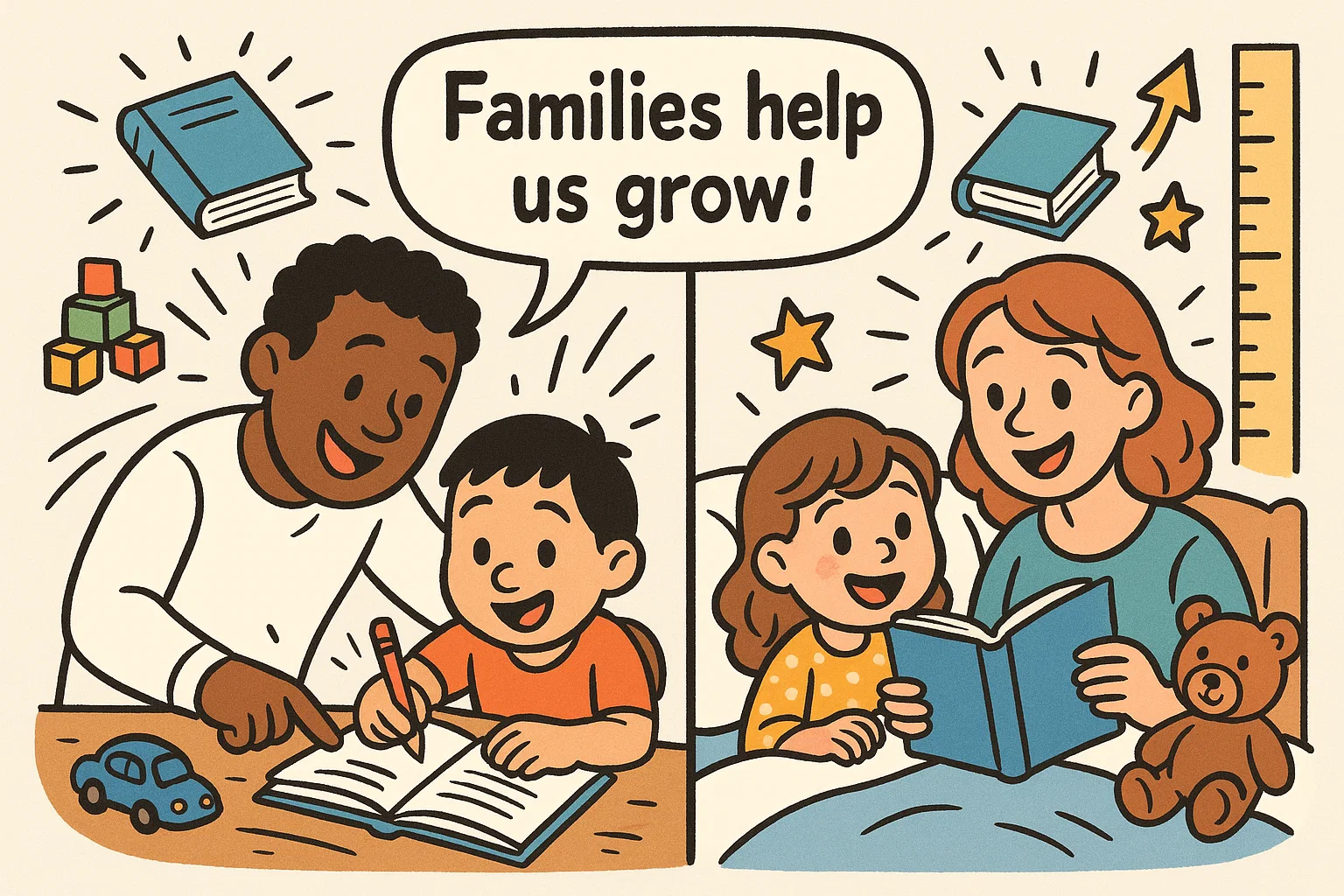
Teaching values and discipline
These primary units serve as the first and most important teacher of values, morals, and behavioral expectations for children. Within this environment, children learn fundamental concepts of right and wrong, respect for others, and personal responsibility that will guide their actions throughout life.
Core Values Typically Transmitted:
- Honesty and integrity
- Respect for others
- Personal responsibility
- Empathy and compassion
- Work ethic and perseverance
Effective discipline involves setting clear boundaries while providing loving support and guidance. This balanced approach helps children develop self-control, empathy, and the ability to make good decisions independently.
Parents and relatives serve as role models, demonstrating through their actions the values they wish to instill in children. This modeling is often more powerful than verbal instruction, as children naturally observe and imitate the behavior of significant adults.
Socialization and communication skills
The development of social skills begins within the home environment, where children learn to communicate effectively, resolve conflicts peacefully, and build positive relationships with others. These early experiences shape their ability to form healthy relationships throughout life.
Interactions provide children with opportunities to practice important social skills such as:
- Communication Skills
- Verbal expression
- Active listening
- Non-verbal communication
- Conflict resolution
- Social Competencies
- Sharing and cooperation
- Negotiation abilities
- Empathy development
- Boundary respect
Children from households that prioritize open communication develop stronger verbal and non-verbal communication abilities. They learn to express their thoughts and feelings clearly while also developing the listening skills necessary for meaningful relationships.
Educational support and success
Support plays a significant role in academic achievement and lifelong learning. When households value education and actively support their children’s learning, students are more likely to succeed academically and develop a positive attitude toward knowledge acquisition.
Research shows that parental involvement in education correlates strongly with:
- Improved academic outcomes
- Higher graduation rates
- Increased likelihood of pursuing higher education
- Better problem-solving skills
- Enhanced critical thinking abilities
The role in education extends beyond homework assistance to include creating a learning-supportive environment and fostering curiosity. The encouragement and expectations provided help children develop academic confidence and resilience in the face of educational challenges.
Preparing for future relationships
The relationship patterns learned within the family serve as templates for future romantic partnerships, friendships, and professional relationships. Children observe how family members interact, resolve conflicts, and show affection, incorporating these lessons into their own relationship skills.
Healthy family relationships teach important concepts such as:
- Trust and commitment
- Compromise and negotiation
- Mutual respect and understanding
- Communication and empathy
- Boundary setting and respect
The security and love experienced within strong families provide individuals with the emotional foundation necessary to form healthy attachments with others. This emotional security reduces the likelihood of developing unhealthy relationship patterns or dependencies.
Family and Society Connection
Families as safe zones and protection
These units serve as protective environments that shield their members from various social, economic, and environmental threats. They provide physical safety, emotional security, and financial protection that enables individuals to thrive despite external challenges.
In times of crisis or social upheaval, households often become the primary source of support and stability for their members. This protective function helps maintain social order and reduces the burden on government and community support systems.
Strong units also protect their members from negative social influences by providing positive role models, clear values, and supportive environments that discourage risky behaviors and promote healthy choices.
Contribution to community values
Households that embody strong values contribute significantly to the moral fabric of their communities. When these units prioritize honesty, integrity, and service to others, they help create communities characterized by trust, cooperation, and mutual support.
The values taught extend beyond individual behavior to influence community standards and expectations. Children who learn to respect others, contribute to the greater good, and take responsibility for their actions become valuable members of society.
Community involvement often begins with participation in local activities, religious organizations, and volunteer efforts. These shared experiences strengthen both bonds and community connections.
Strengthening social cohesion
Strong households contribute to social cohesion by creating stable neighborhoods, supporting local institutions, and fostering positive relationships between different community groups. When these units are stable and engaged, entire communities benefit from:
- Reduced crime rates
- Increased civic participation
- Stronger economic development
- Better educational outcomes
- Enhanced social trust
The social networks created by extended relatives and friends help build the connections that hold communities together. These relationships provide mutual support, information sharing, and collaborative problem-solving that benefits everyone involved.
Families as pillars of national development
At the national level, strong households contribute to economic growth, political stability, and social progress. Countries with high levels of stability tend to have lower crime rates, better educational outcomes, and stronger economic performance.
The human capital developed forms the foundation of national competitiveness and innovation. When households successfully prepare their members for productive participation in society, the entire nation benefits from increased productivity and social stability.
Values such as hard work, education, and civic responsibility directly contribute to national development by creating citizens who are engaged, productive, and committed to the common good.
Modern Challenges for Families ⚡
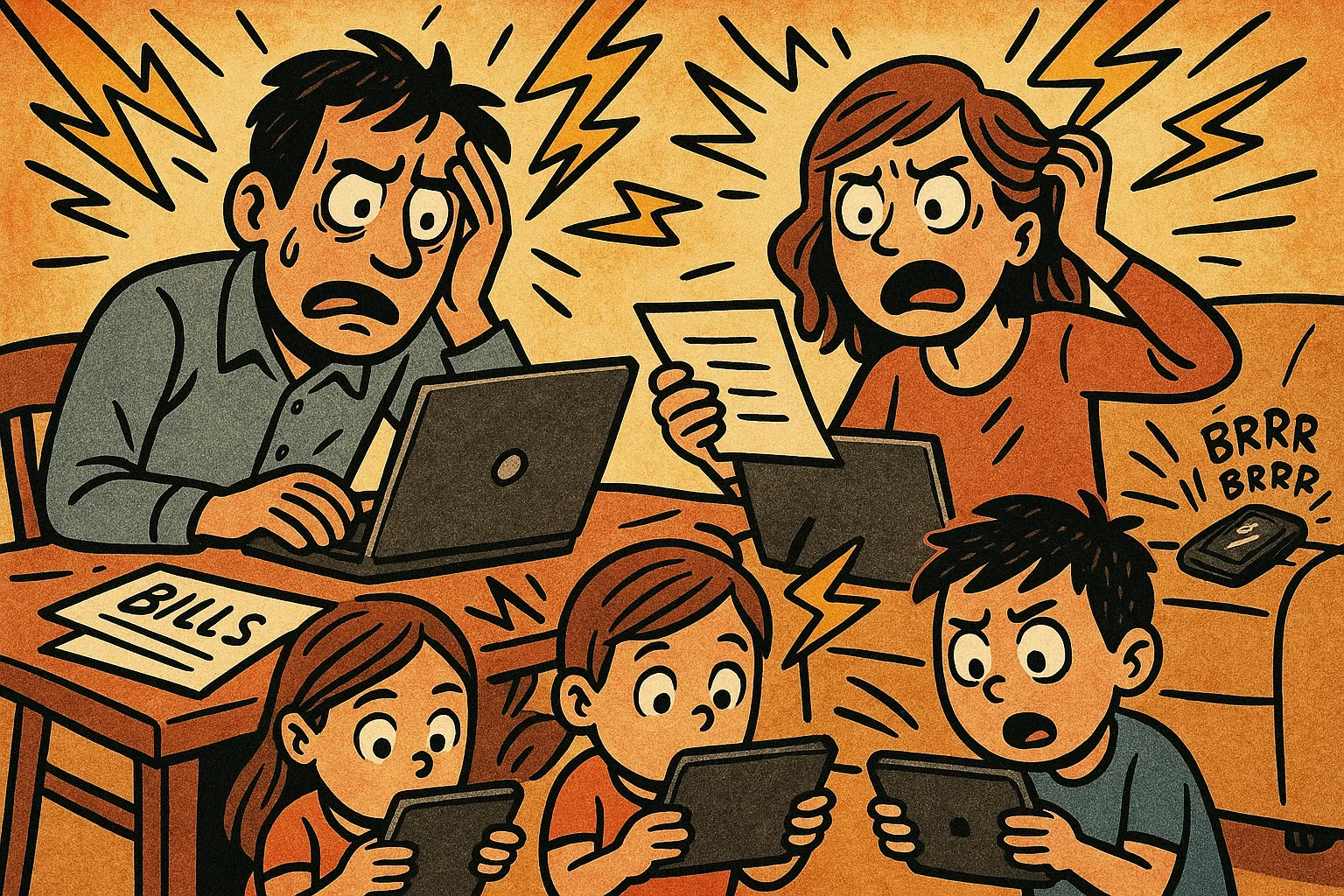
Work–life balance issues
One of the most significant challenges facing modern households is achieving a healthy balance between career demands and personal responsibilities. The pressure to succeed professionally often conflicts with the time and energy needed to maintain strong relationships.
Common Work-Life Balance Challenges:
| Challenge | Impact | Potential Solutions |
| Long work hours | Reduced quality time | Flexible scheduling |
| Career travel | Physical separation | Technology for connection |
| Dual careers | Schedule coordination | Shared responsibilities |
| Financial pressure | Increased work demands | Budget planning |
Dual-career households face particular challenges in coordinating schedules, sharing household responsibilities, and ensuring adequate time for bonding. The stress of managing multiple competing priorities can strain relationships and reduce the quality of interactions.
Technology has both helped and complicated balance issues. While remote work options provide more flexibility for some, constant connectivity also makes it difficult to establish clear boundaries between work and personal time.
Technology and digital distractions
Digital technology presents both opportunities and challenges for modern households. While technology can enhance communication and provide educational resources, excessive screen time and social media usage can also create barriers to meaningful interaction.
Children growing up in the digital age face unique challenges related to:
- Online safety and cyberbullying
- Digital addiction and dependency
- Social media pressure and comparison
- Reduced face-to-face communication skills
- Sleep disruption from screen time
Parents must navigate these challenges while often lacking the technical knowledge to provide effective guidance. The addictive nature of many digital platforms can interfere with communication and bonding.
Financial stress and instability
Economic pressures significantly impact stability and well-being. Financial stress can strain relationships, limit opportunities, and create anxiety that affects all members. Rising costs of living, healthcare, and education place increasing pressure on budgets.
Job insecurity and economic uncertainty make it difficult to plan for the future and maintain stability. These pressures can force difficult decisions about work schedules, living arrangements, and lifestyle choices that impact relationships.
Financial stress often creates a cycle where the need to work longer hours to generate income reduces the time available for relationships, potentially weakening the very bonds that provide emotional support during difficult times.
Divorce, single parenting, and blended families
The increasing prevalence of divorce and single-parent households presents unique challenges for maintaining strong bonds. Children in these situations may experience loyalty conflicts, adjustment difficulties, and uncertainty about stability.
Single parents face the challenge of providing both emotional and practical support for their children while managing responsibilities typically shared between two parents. This can create stress and limit resources available for bonding activities.
Blended units must navigate complex relationships between step-parents, step-children, and extended members. Creating unity and establishing new traditions while respecting existing relationships requires patience, understanding, and clear communication.
Family and Mental Health
Support during illness and crisis
These primary units play a crucial role in providing support during mental health crises and chronic illnesses. The emotional support, practical assistance, and advocacy provided can significantly impact recovery outcomes and long-term well-being.
When members understand mental health challenges and respond with compassion rather than judgment, they create environments that promote healing and recovery. This support is particularly important for individuals experiencing depression, anxiety, or other mental health conditions.
The stability and unconditional love provided can serve as protective factors against mental health problems and provide motivation for seeking treatment when needed.
Improving communication and empathy
Healthy communication patterns promote emotional intelligence and empathy development in all members. When households practice active listening, express emotions appropriately, and resolve conflicts constructively, they create models for healthy communication in all relationships.
Key Communication Skills Developed:
- Active listening techniques
- Emotional expression abilities
- Conflict resolution strategies
- Empathy and understanding
- Non-violent communication methods
Open communication allows members to share their struggles, celebrate successes, and provide mutual support. This emotional intimacy strengthens bonds and promotes individual mental health.
Units that prioritize empathy and understanding create environments where members feel valued and accepted, reducing the risk of depression, anxiety, and behavioral problems.
Counseling and therapy for families
Professional counseling can help households develop better communication skills, resolve conflicts, and strengthen their relationships. Therapy recognizes that individual problems often reflect broader dynamics and works to address these systemic issues.
Preventive counseling can help develop the skills needed to navigate challenges before they become serious problems. This proactive approach strengthens resilience and improves overall functioning.
When households participate in counseling together, they demonstrate commitment to their relationships and model problem-solving skills for children and other members.
Values That Strengthen Families ❤️

Love and loyalty
Unconditional love forms the foundation of strong relationships. When members know they are loved regardless of their mistakes or shortcomings, they develop the security and confidence needed to grow and take healthy risks.
Respect and responsibility
Mutual respect creates an environment where all members feel valued and heard. This includes respecting individual differences, opinions, and developmental stages while maintaining appropriate boundaries and expectations.
Education and hard work
Households that value education and hard work provide their members with the tools needed for personal and professional success. This value extends beyond formal education to include lifelong learning, skill development, and personal growth.
Community and service
Units that emphasize service to others and community involvement develop a sense of purpose that extends beyond their immediate needs. This outward focus strengthens bonds while contributing to the greater good.
Ways to Strengthen Family Bonds
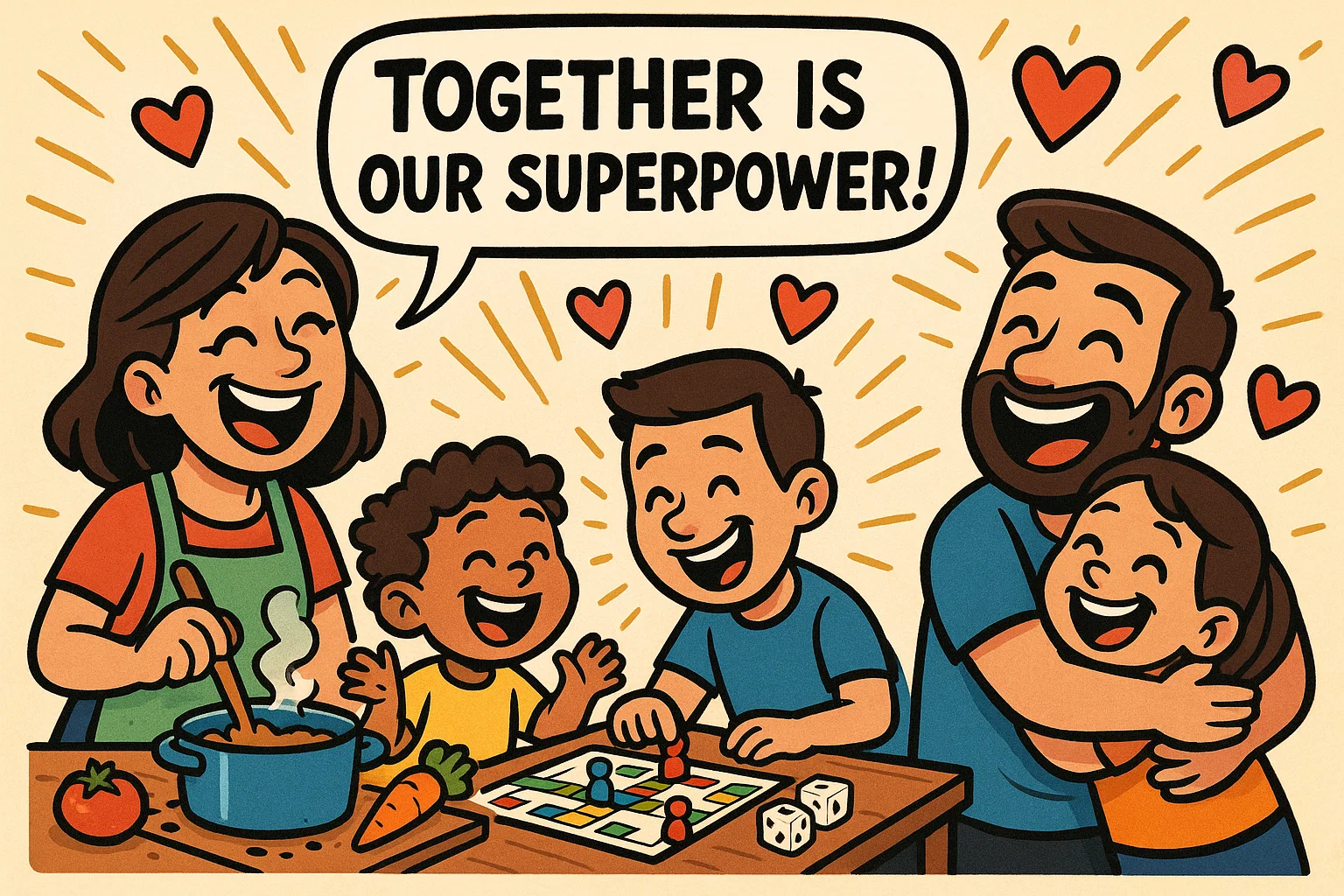
Quality time together
Regular family time is essential for maintaining strong relationships and creating positive memories. This time should be protected from work demands, technology distractions, and other competing priorities.
Quality time doesn’t require expensive activities or elaborate planning. Simple activities like shared meals, evening walks, or game nights can provide valuable opportunities for connection and communication.
Open communication
Honest, respectful conversation forms the backbone of strong relationships. Households should create safe spaces where members can express their thoughts and feelings without fear of judgment or rejection.
Celebrating traditions and milestones
Traditions create continuity and identity that strengthen bonds across generations. These can be large celebrations or small rituals that mark important moments and create shared memories.
Balancing independence and unity
Healthy households encourage individual growth and independence while maintaining strong connections and mutual support. This balance requires ongoing negotiation and adjustment as members develop and change.
Supporting individual goals and interests demonstrates love and respect while strengthening the overall unit. When members pursue their passions with support, they often achieve greater success and satisfaction.
Conclusion
The importance of family in modern society cannot be overstated. Despite the challenges and changes facing contemporary households, the fundamental role as the cornerstone of society remains constant. Families provide the support, value formation, and social development that create healthy individuals and stable communities.
Modern households may look different from traditional models, but their essential functions continue to serve crucial roles in human development and social cohesion. By understanding these roles and working actively to strengthen relationships, we contribute not only to our own well-being but to the health and stability of a stable society.
The investment in relationships pays dividends across generations, creating a positive cycle of support, growth, and contribution that benefits everyone involved. As we navigate the complexities of modern life, prioritizing bonds and values provides the foundation needed for personal fulfillment and social progress.


